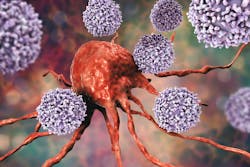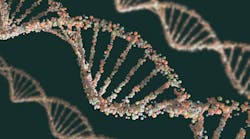In a new study published in Nature Biomedical Engineering, researchers at The University of Texas MD Anderson Cancer Center have designed a new method for developing immunotherapy drugs using engineered peptides to elicit a natural immune response inside the body.
In preclinical models of locally advanced and metastatic breast cancer, this method improved tumor control and prolonged survival, both as a monotherapy and in combination with immune checkpoint inhibitors.
The body’s immune system is built to patrol and identify infected or diseased cells to eliminate, but cancer cells often exploit weaknesses in the immune system to avoid detection. The goal of immunotherapy is to bolster the body’s natural ability to identify and destroy cancer cells. Current immune checkpoint inhibitors are antibodies designed to block specific immune signaling pathways.
The engineered peptide improves the immune system’s ability to detect and destroy cancer cells in a unique way. Rather than using an external compound to initiate a response, or harvesting and modifying immune cells for cell therapies, the peptide serves as a messenger to activate specific signaling pathways in immune cells to boost their performance.
University of Texas MD Anderson Cancer Center release on Newswise





